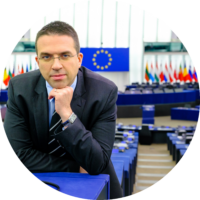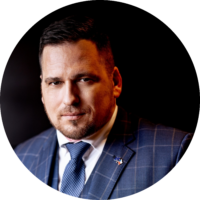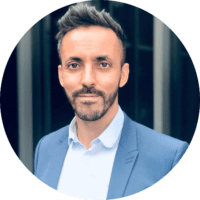
MEP Tomislav Sokol
Group of the European People’s Party (Christian Democrats)
Tomislav Sokol was born in Zagreb in 1982. He obtained his first degree in law at the Faculty of Law, University of Zagreb, in 2006, magna cum laude. He then obtained a Masters of Law (LL.M.) specialising in European Union Law at the Katholieke Universiteit Leuven (KUL), Belgium, in 2009, magna cum laude. He defended his PhD at KUL, dealing with free movement of cross-border health care services in the EU and its impact on national health insurance systems in 2014.
He was an Assistant Minister in the Ministry of Science and Education in 2017, after which he became a Member of the Croatian Parliament. He was a Member of the Croatian Parliament until July 2019, when he became a Member of the European Parliament. He is EPP Coordinator in Committee on Public Health (SANT), Member of the Committee on the Internal Market and Consumer Protection (IMCO), Substitute Member of the Committee on the Environment, Public Health and Food Safety (ENVI) and Committee on Constitutional Affairs (AFCO) in the European Parliament. Mr. Sokol is main Rapporteur for the European Health Data Space and EPP Shadow Rapporteur for Pharmaceutical legislation (Regulation).
So far, he has published around 20 papers and 1 book on issues concerning EU law, including several articles in European journals, such as the European Law Review and the European Law Journal. He has presented papers at many international conferences and worked on different research projects. Currently, he is a Senior Lecturer at the Zagreb School of Economics and Management where he has taught Introduction to European Union and Principles of Law courses since the academic year 2010/2011. He is also an assistant professor at the Catholic University of Croatia where he has taught since the academic year 2016/2017. His areas of professional interest include the law of the European common market, EU health law, competition law, International and European social law and International and European trade law.

MEP Tomáš Zdechovský
Group of the European People’s Party (Christian Democrats)
Tomáš Zdechovský is a Member of the European Parliament representing the Czech Republic (KDU-ČSL) since 2014. Dedicated to public health and social well-being, Zdechovský has consistently championed policies aimed at improving mental health and brain health across Europe. As a member of the Committee on Civil Liberties, Justice and Home Affairs (LIBE) and a former crisis manager, he has a deep understanding of the social and economic challenges posed by neurodegenerative diseases like Alzheimer’s.
Zdechovský is committed to fostering European-level cooperation on research, prevention, and treatment of brain disorders. He advocates for sustainable healthcare funding and innovative public-private partnerships to enhance early diagnosis and improve access to care. By integrating mental health into broader public health strategies, he seeks to address the growing burden of brain health on national and global health systems.
His engagement with patient advocacy groups and support for increased awareness campaigns underlines his belief in mental and brain health as a fundamental pillar of European public health policy. Recognized for his evidence-based approach to policymaking, Zdechovský continues to push for initiatives that prioritize brain health as an essential aspect of achieving long-term societal resilience and well-being.

Prof. Dr. Sebastiaan Engelborghs
Full professor of neurology and neurosciences at Vrije Universiteit Brussel
Sebastiaan Engelborghs is full professor of neurology and neurosciences at Vrije Universiteit Brussel (VUB), chair of research group NEUR (Neuroprotection & Neuromodulation), co-director of the VUB Center for Neurosciences (C4N) and chairman of the neurology department of the VUB university hospital (UZ Brussel). He is co-founder and co-director of the transdisciplinary memory clinic in UZ Brussel, Brussels Integrated Center for Brain and Memory (Bru-BRAIN). He as well is full professor of neurosciences and neurochemistry at University of Antwerp.
Sebastiaan Engelborghs is board certified in clinical neurology (2001) and neurological revalidation medicine (2009). He achieved a PhD in medical sciences in 2004 and has interdisciplinary expertise in clinical neurology and neurosciences, including electrophysiology, neuroimaging, biochemistry, neurogenetics and neuropathology. Both clinically and with regard to research, he is specialized in neurodegenerative brain disorders that cause dementia. He has built up expertise in clinical trials for AD and related disorders for more than 25 years and was PI as well as national or global coordinating physician for several clinical trials, as well as being involved in the design of some of these clinical trials. Sebastiaan Engelborghs serves as co-chair of the European Alzheimer Disease Consortium (EADC), as co-chair of the dementia and cognitive disorders scientific panel (SP) of European Academy of Neurology (EAN) and is vice-president of the Belgian Dementia Council (BeDeCo). He is co-inventor of one patent and is academic promoter of two spin-off companies, Epilog and ADx Neurosciences.
He is (co-)author on 432 PubMed-cited papers in international peer-reviewed journals and 19 book chapters which results in 35.228 citations without self-citations, and a h-index of 82.

Kristiya Ivanova
Volunteer Expert, Alzheimer Bulgaria civic association
Kristiya Ivanova is volunteer expert at the Alzheimer Bulgaria civic association and at the currently coordinates a campaign of the social enterprise of the association – TheSocial Store. The initiative is aimed at providing timely support for people with dementia, their families and carers through expanding access to specialist resources such as 3D printed materials adapted into games that stimulate cognitive and social activity. Kristiya is a actively working on the project “Non-medical therapies for maintaining cognitive abilities of people affected by dementia” of the Alzheimer’s Society Bulgaria”, which is being run at Blocks Health and Social Care. It runs various therapies such as music therapy, art therapy, Story2Remember and cognitive games in order to support and maintain cognitive abilities and emotional wellbeing of people suffering from dementia.

Katerina Valkova
Associate Director, European Public Policy, Bristol Myers Squibb
Katerina Valkova spearheads Bristol Myers Squibb’s initiatives to engage external stakeholders in the Alzheimer’s disease and mental health sectors at the European level. She also oversees BMS’s external engagements related to the revision of the General Pharmaceutical Legislation, with an emphasis on future-proofing the European regulatory network.
Before joining BMS, Katerina served as Head of Office to a Member of the European Parliament for five years. Her previous roles include positions at the European Commission, UNDP, and a news website in Bulgaria.
Katerina holds a Master’s degree in Health Economics and Pharmaeconomics from Pompeu Fabra University in Barcelona, Spain, an MSc in Security Studies from University College London, UK, and a Joint Honours BA in International Relations and Russian Language from the University of Leeds, UK.














